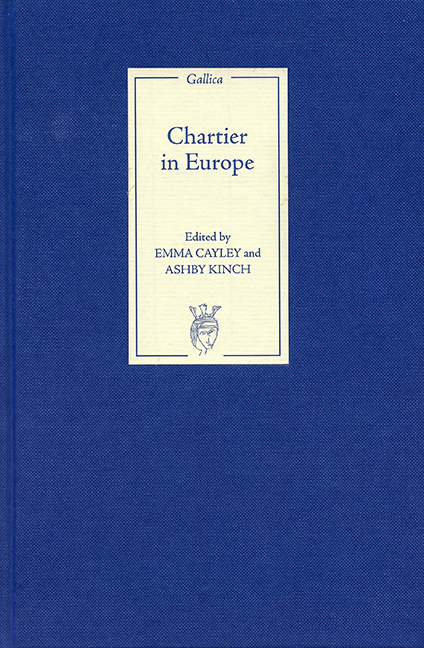Book contents
- Frontmatter
- Contents
- Foreword
- List of Contributors
- Acknowledgements
- List of Abbreviations
- Introduction
- Part I Authorising Chartier
- Part II Transmitting Chartier
- 5 ‘Ainchois maintien des dames la querelle’: Poetry, Politics and Mastery in the Manuscript Tradition of Alain Chartier
- 6 Cyclification and the Circulation of the Querelle de la Belle Dame sans mercy
- 7 The Early Reception of Chartier's Works in England and Scotland
- Part III Translating Chartier
- Bibliography
- Index
- Miscellaneous Endmatter
6 - Cyclification and the Circulation of the Querelle de la Belle Dame sans mercy
from Part II - Transmitting Chartier
Published online by Cambridge University Press: 24 October 2017
- Frontmatter
- Contents
- Foreword
- List of Contributors
- Acknowledgements
- List of Abbreviations
- Introduction
- Part I Authorising Chartier
- Part II Transmitting Chartier
- 5 ‘Ainchois maintien des dames la querelle’: Poetry, Politics and Mastery in the Manuscript Tradition of Alain Chartier
- 6 Cyclification and the Circulation of the Querelle de la Belle Dame sans mercy
- 7 The Early Reception of Chartier's Works in England and Scotland
- Part III Translating Chartier
- Bibliography
- Index
- Miscellaneous Endmatter
Summary
The poems written by Alain Chartier in the early fifteenth century experienced a popularity clearly attested to by the sheer quantity of extant copies. There are 115 manuscripts which have been identified as containing copies of his poetical works. Descriptions given by James Laidlaw in his edition of Chartier's poems indicate that the manuscripts containing this author's work range from luxury codices belonging to kings and queens, such as Paris, BnF, fr. 2235, or Paris, BnF, fr. 2230, to the ‘working’ manuscripts of lawyers or clerics exemplified by Paris, Arsenal, 3523, or Chantilly, Musée Condé, 686; some serve as an author corpus (BnF, fr. 833), some are beautifully orchestrated collections of narrative love poems (BnF, fr. 1131) and some are single-work manuscripts (BnF, fr. 2235). There are parchment manuscripts, illuminated and plain, as well as many paper manuscripts. The very abundance and variety of manuscript style and status serves to suggest that Chartier was widely read by audiences both high and low.
By far the most popular of his poems, with contemporary readers as well as readers today, is the 800 line lovers’ debate entitled in its final verse La Belle Dame sans mercy. Indeed, the BDSM has been cited as the most well-known French literary work in the Middle Ages since the Roman de la Rose, a popularity attested by the fourty-four manuscripts in which the poem is extant. The BDSM introduces a lady who coldly and without apology refuses her lover, ultimately provoking his grief-stricken death. The uncourtly conclusion to the poem inspired a clever and contentious literary debate, what we now refer to as the Querelle or Cycle de la Belle Dame sans mercy.
The Querelle de la BDSM testifies to the volatile reaction of some eighteen poetic voices of the middle of the fifteenth century. Begun with letters allegedly written to Chartier by ladies and noblemen of Charles VII's court shortly after the poem's appearance in 1424, the Querelle centered on the courtly dilemma of whether or not the Belle Dame was justified in refusing her lover. These erotico-juridical poems either continued or evaluated Chartier's poem, stirring up a scandal that would make the Belle Dame an infamous femme fatale.
- Type
- Chapter
- Information
- Chartier in Europe , pp. 91 - 104Publisher: Boydell & BrewerPrint publication year: 2008

